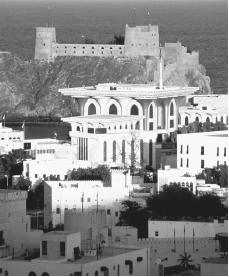Religion of Oman
Religion
Religious Beliefs:
Nearly all Omanis are Muslim, divided nearly equally into Sunnis and Ibadis with a small percentage of Shia. A few families of Indian origin are Hindu but there are no Omani Christians or Jews. Omanis tend to be careful in their observance of religious obligations. Most carry out the prescribed five prayers per day and many men go to nearby mosques to perform them. Most Omanis observe the dawn-to-dusk fasting required during the Islamic month of Ramadan, and it is against the law to eat, drink, or smoke in public during daylight hours in Ramadan. In addition to formal religious beliefs and practices, superstitions are common and some folk rituals are practiced.
Religious Practitioners:
There is little formal religious hierarchy. The government appoints the mufti who serves as the country's highest Islamic authority. Traditional religious educators, known as sheikhs, are trained by the Ministry of Awqaf

View of Muscat city buildings along the Gulf of Oman. Oman is a sultanate, with a sultan as the head of state and government.
Rituals and Holy Places:
All Omani Muslims are obliged to fast during Ramadan. One of the pillars of Islam, this period of abstinence lasts twenty-nine or thirty days. This month is also one of celebration and prayer and is followed by two important festivals, one immediately after the period of fasting, Eid-il-Fitr, and one sixty-six days later, Eid -il Adha. Many Omanis undertake the hajj, or pilgrimage to the holy city of Mecca (in Saudi Arabia), if they are physically and financially able. Because of the austerity of Ibadi Islam, there are no specific holy places in northern Oman; there are, however, some venerated tombs of "saints" in Dhofar.
Death and the Afterlife:
Omanis are pragmatic when it comes to dealing with sickness. They will try modern medicine but if that fails will turn to traditional healers. Traditional herbalists, bonesetters, and exorcists have a thriving practice, especially in the interior of the country. Many look to the cold and hot properties of foods for curing sickness (a common practice in Islamic belief). Spirit possession, often among women, is addressed through zar, or exorcism, ceremonies, which frequently involve the community in the curative process.
Secular Celebrations
National Day takes place on 18 November, the birthday of the sultan, Qabus ibn Sa'id. This is the principal nonreligious celebration of the year and includes a major pageant, a profusion of fireworks around the country, and the sultan's annual policy speech. Armed Forces Day (11 December) is the occasion for a large banquet hosted by the sultan for his officers, senior government officials, and the diplomatic corps. The Islamic, but not the Christian, New Year's Day is an official holiday.
The Arts and Humanities
Support for the Arts:
The government provides some limited assistance for the arts through subsidies to such organizations as the Omani Arts Society. Most artists, however, either hold full-time jobs or come from well-to-do families.
Literature:
In the past, literature was confined to religious treatises and histories. Like other Arabs, Omanis gave great importance to oral traditions, including poetry and an emphasis on genealogical roots. The Ministry of Information has sought to revive these traditions through folk programs on radio and television. In the last decades of the twentieth century, a small number of authors published works of fiction and poetry.
Graphic Arts:
Traditional Omani handicrafts are in decline although periodic attempts are made to encourage their production. Notable handmade products include silver and gold jewelry, woven baskets, goat- and camel-hair rugs, swords and khanjars (daggers), and large pottery water jugs. Drawing, painting, and photography have become popular forms of expression in educated circles, although artists still tend to avoid representation of the human form as per Islamic convention.
Performance Arts:
Local instrumental and vocal music is very popular, as are songs from other Arab countries. Traditional performers still provide songs and dances at events such as marriages. The Ministry of National Heritage and Culture maintains a small national theater. Arab entertainers are well known throughout the country and many educated Omanis enjoy Western performance arts.
The State of the Physical and Social Sciences:
Physical sciences, particularly earth sciences such as geology and hydrology, are popular subjects for study and research in Oman's university and in a number of government ministries. The social sciences, however, are not as well represented. Economics and sociology are taught at the university, but anthropology, political science, and psychology are not.



Comments
Post a Comment